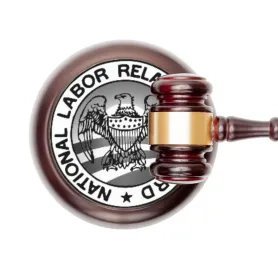The COVID-19 crisis raises issues regarding nearly every aspect of the employment relationship. For employers with union-represented employees, the rights of employees and obligations of employers set forth in the National Labor Relations Act (“NLRA”) add to the already long list of issues that must be taken into account. With that in mind, we hope this guidance will be of help.
I. THE DUTY TO BARGAIN
It is well-known that employers must bargain with unions representing their employees before making changes to wages, hours or terms and conditions of employment. This bargaining obligation can be difficult in ordinary business circumstances. In emergency circumstances, the bargaining obligation could be such an impediment that a business might not be able to meet the obligation and still make the changes needed to survive.
It is possible that the National Labor Relations Board might decide to give employers a break with respect to the duty to bargain. In the past, the Board has on rare occasions recognized an exception to the duty to bargain, applicable when “economic exigencies compel prompt action.” The Board has not issued any guidance regarding whether the COVID-19 crisis fits this exception. Rather than issuing an unqualified statement that all bargaining obligations are suspended due to the COVID-19 crisis, the Board could consider the “economic exigencies” argument on a case-by-case basis when employers defend their decisions to forego bargaining in the context of responding to unfair labor practice charges. So, any employer considering using the “economic exigencies” defense is stepping into the unknown.
Fortunately, some collective bargaining agreements offer a more certain path than the rarely used “economic exigencies” exception. A few agreements may have “force majeure” clauses that excuse performance of contractual obligations in times of emergency. Employers should keep in mind that “force majeure” clauses are likely to be interpreted narrowly, meaning that any changes unilaterally implemented under the umbrella of a “force majeure” clause had better be emergency in nature, and tightly linked to the circumstances surrounding the COVID-19 virus.
“Management rights” clauses are far more common than “force majeure” clauses, and thus much more likely to be of help. These clauses often include language that preserves management’s discretion to make or change work rules during the contract term. In September 2019, the National Labor Relations Board strengthened employers’ ability to rely on management rights clauses when it issued a decision in a case captioned MV Transportation, Inc. With this decision, the Board changed its long-standing rule that an employer has a duty to bargain over a subject unless the union had “clearly and unmistakably waived” its right to bargain. Instead, the Board now applies the more common-sense standard that, if a subject is “covered by the contract,” it has been bargained. The distinction between these two standards may seem obscure to persons not familiar with Board cases, but the impact is significant. If a contract “covers” the right to make or change work rules, and the work rules to be made or changed do not contradict some other specific provision found elsewhere in the contract, then there is a reasonable chance that management has the flexibility it needs.
A word of caution is due here. Each contract is different. Also, it is important that employers do not make the mistake of thinking that the new “contract coverage” standard somehow expands the scope of rights set forth in their management rights clauses. If a management rights clause allows management to make or change work rules, that does not mean management now has the right to make unilateral changes to wages and benefits. These things must still be bargained. And, the effects of all unilateral changes must be bargained. Still, the Board’s 2019 decision in MV Transportation, Inc. was fortuitous, because it will give some employers significantly more discretion to deal with the myriad of problems the COVID-19 virus has created.
II. INFORMATION REQUESTS
Many unions have been sending out requests seeking information about how employers are protecting employees from the COVID-19 virus. Some requests are accompanied by a demand to bargain over any changes employers may be contemplating.
The Board requires employers to respond to information requests that are reasonably related to collective bargaining. The Board does not define “collective bargaining” narrowly such that the only time employers have a duty to respond is when they are negotiating a contract. Rather, the term “collective bargaining” can be understood to refer to the entire labor-management relationship. Given this very broad definition, an employer’s response to the virus is reasonably related to collective bargaining. Moreover, it does not matter whether an employer happens to be in negotiations with the union or not, the obligation to respond applies.
The Board has not established a bright line test for how long an employer must respond to information requests. The standard is “a reasonable time.” Depending on the business an employer is in, that can vary significantly. While it is fair to say that all businesses are facing difficult challenges, a hospital in the midst of handling an influx of patients, for example, does not face the same circumstances as a manufacturer. This is true both of the resources the employer may be able to bring to bear on the task of responding, and on the urgency of the union’s need for information.
Keeping in mind that no two employers are in the exact same circumstances, these general guidelines are nevertheless advisable:
-
Don’t ignore requests. Respond promptly, even if the best you can do now is to let the union know that you have the request and will work on it.
-
Try to be “reasonable.” Remember that the union’s members probably expect the union to have some knowledge about what employers are doing. If you have responsive information that can be provided without disrupting the essential tasks needed to secure your business future, send it. A partial response is better than no response.
-
Don’t feel compelled to go beyond what is reasonable. This is uncharted territory, but if someday the union files a charge against you for failing to respond, there is some basis to think that the Board will take the current circumstances into account. After all, the Board has suspended union elections, and closed some of its regional offices.
-
If the request is accompanied by a demand to bargain, don’t ignore that either. As explained above, check your management rights clause to determine whether one response available to you is, “we respectfully disagree that there is a need to bargain, because this subject falls within the scope of the management rights clause.”
Lastly, regardless of whether an employer’s contract language preserves the right to make a unilateral change, and regardless of the employer’s circumstances that may dictate how promptly or completely a response to a request for information can be put together, the best advice is to communicate with the union. Do this often, and document it. No one wants to persevere through the COVID-19 crisis, poised to bounce back in response to a resurgence in business, only to have to deal with the burden of responding to unfair labor practice charges that could have been avoided.




 />i
/>i

